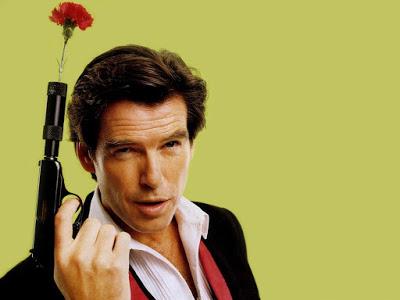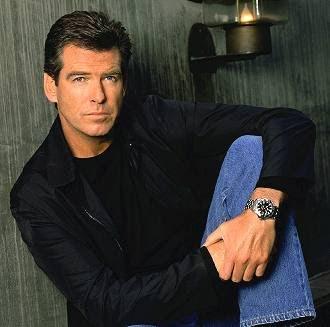
I interviewed Pierce Brosnan in conjunction with his third outing as James Bond, in Michael Apted's The World Is Not Enough, in 1999. Brosnan was alternately charming, erudite, thoughtful and intense during our two hour chat. His native intelligence shone through it all, as did a sense of decency which many people seem to acquire after enduring and surviving hardship in their formative years.
BONDING WITH BROSNAN
By
Alex Simon
There are several dangers in becoming a cultural icon, not the least of which is the stigma that your public will forever keep you imprisoned in the mold of your iconography, allowing the recipient a privileged, if imprisoned, existence, particularly if that person is an artist. Sean Connery faced just such a dilemma during the height of James Bond-mania in the mid-60's. A serious actor, Connery desperately wanted to break out of the action hero mold that was British Superspy James Bond, agent 007, and tackle more "serious" roles, finding it an uphill and bloody battle the whole way. Since Connery's day, the torch of James Bond has been passed to four different men, the latest being Irishman Pierce Brosnan. Brosnan, also a serious actor with roots in the British theater, has also begun his own attempt at breaking the Bond mold, forming his own production company, Irish Dream Time, with partner Beau St. Clair, and producing small, personal projects such as The Nephew (1998) as well as commercial blockbusters such as last summer's The Thomas Crown Affair. Brosnan carries himself onscreen with the debonair flair of an Oxbridge gentleman, but in fact, like his predecessor Sean Connery, his roots are the antithesis of the iconography which has been imposed upon him.
Pierce Brendan Brosnan was born May 16, 1953 in Drogheda, County Louth, Ireland. Shortly after his birth, his father walked out on he and his mother. Soon thereafter, his mother went to London to work as a nurse, leaving her only child in the care of various relatives. Being the only lad in the tiny community without either parent at home, Brosnan found himself in the position of an outsider, and did his best to fit in by being an altar boy in his local parish. At the age of 11, Brosnan was sent to London to live with his mother in the city's tough south side, where they struggled financially. Again an outsider, he was labeled "Paddy," and "the Mick" by his classmates, and turned to humor to defend himself from harm's way, not always with success. Brosnan cites a life-changing moment at this period, when his mother and stepfather took him to see the James Bond classic Goldfinger (1964) in a swank London cinema. At 16, he left school, aspiring to be a commercial artist, but was soon diverted after tagging along to an audition with a friend, and was bitten by the acting bug. Needless to say, the bite never healed.
Brosnan spent the next ten years doing both experimental and legitimate theater, working with the likes of Tennessee Williams and Joan Plowright on the London stage. It was here Brosnan met his late wife, the actress Cassandra Harris (Bond fans will remember her as "Countess Lisl" in For Your Eyes Only (1981)), who succumbed to ovarian cancer in 1991. Brosnan credits Harris with pushing and encouraging him in his craft, saying "Without her, I would most likely still be back in London doing plays."
After some bit roles in British TV, Brosnan's first movie role came in the gangster classic The Long Good Friday (1981), in a terrifying turn as an IRA hitman. Brosnan had no dialog and only two scenes, but the juxtaposition of his cheerfully boyish looks and his deadly behavior made an impression on everyone who saw the film. This led to his being offered the lead in the epic American mini-series The Manions of America (1981). The ratings hit prompted Brosnan and Harris to relocate their family to the U.S. Almost immediately, Brosnan was cast as the lead in the hit NBC series Remington Steele (1982-87), solidifying his fame as a sex symbol and a debonair leading man. Many fans hailed him as a modern day Cary Grant, prompting James Bond producer Albert 'Cubby' Broccoli to pursue him as the new James Bond, following the retirement of Roger Moore, in 1986. Just hours away from signing his Bond contract, Remington Steele was renewed on NBC, forcing Brosnan to abandon the lucrative franchise to finish his commitment to the network. Timothy Dalton donned the Aston-Martin for two Bond films The Living Daylights (1987) and License to Kill (1989). After Steele ended its run in 1987, Brosnan did a variety of TV and film work, most notably the spy thriller The Fourth Protocol (1987) in a terrifying turn as a cold-blooded Russian agent, the miniseries James Clavell's Noble House (1988), Bruce Beresford's acclaimed drama of culture clash in colonial Africa Mr. Johnson (1991), a comic foil to Robin Williams' Mrs. Doubtfire (1993), and the other object of Annette Benning's affections in Love Affair (1994). 1995 finally brought Brosnan back to the role he was born to play. Many Bond scholars (for lack of a better word) consider Brosnan's debut as Bond in GoldenEye, the move that saved the series from extinction. A box office smash world-wide, it was followed by appearances in The Mirror Has Two Faces (1996, again as the "other man"), the spoof Mars Attacks! (1996), the volcanic thriller Dante's Peak (1997), then Brosnan Bond #2, Tomorrow Never Dies (also 1997). In 1998, Brosnan and St. Clair formed Irish Dream Time, producing the charming The Nephew (1998) in which Brosnan had a small part, and John McTiernan's dynamite remake of the Steve McQueen classic The Thomas Crown Affair.
Brosnan's latest release is Bond #3, The World is Not Enough, directed by veteran helmer Michael Apted. In this latest high octane adventure, Bond must guard the life of a woman (the excellent Sophie Marceau) against that of her former kidnapper (The Full Monty's Robert Carlyle, also wonderful), a psychotic terrorist, who is slowly dying from a bullet that didn't kill him enough. The World is not only the best Brosnan Bond, but one of the best films of the series, hearkening back to the earliest Bond adventures, Dr. No (1962) and From Russia With Love (1963), with its hard-edges and wonderfully drawn characterizations. This is a thriller about real people that never stops moving, the best of both worlds. Fine support is given by Denise Richards, the marvelous Dame Judi Dench, the venerable Desmond Llewelyn, and former Monty Python (himself an icon) John Cleese. The MGM/UA release opens November 19. Don't miss it.
Something of a renaissance man, Brosnan is active in many philanthropies in addition to his film work. A tireless campaigner for environmental issues, he is also a champion of women's health issues (particularly the fight against ovarian cancer), and even made the bold move of boycotting the French premiere of GoldenEye to protest nuclear testing in the Pacific. Brosnan spoke to us from his home in Malibu, where he lives with fiancee Keely Shaye Smith and their young son, about these, and other topics. Needless to say, the conversation left us stirred, but never shaken...
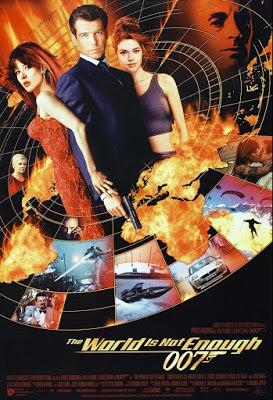
We felt that The World is Not Enough is your best Bond, and one of the best of the series.
Pierce Brosnan: Yeah, I think it's pretty damn good, actually. It's found a certain stride to itself. From my perspective, I was very comfortable with it. When it's your third one, you'd better know what you're doing, and enjoy what you're doing. Having Michael Apted there was great, too, because he paid attention to character and to story, not that the other guys didn't, but Michael just listened. So we had a good time with it.
I liked the moral ambiguity that was brought back to Bond's character.
When (Michael and I) met and talked about it, our conversations were about that exactly. Who is this man? What's at stake for him? Seeing behind the curtain of who he is a little bit more, making it so the writing has some meaning, some emotional cornerstone so the character has a motivation and can have more of a relationship with someone like 'M' (Judi Dench), for example. So you end up caring about them.
I felt like it was a throwback to the first two Bond films, which were more straightforward spy films rather than live action cartoons.
Good, because that's what we were going for. If anything, the bells and whistles around (Bond) have gotten so big, it was a challenge to make it a real drama within the context of a Bond movie. I was really impressed with the final result, especially the fact that Michael really paid attention to the casting of it, and used his cinematic flair. He's not the obvious choice, maybe, for a Bond film, but he's a wonderful filmmaker and has a touch with the camera and story. And he was clever enough to let the guys who do all the technical wizardry get on with it. He used them without interfering with what they did, and used them as a theatrical director should use them.
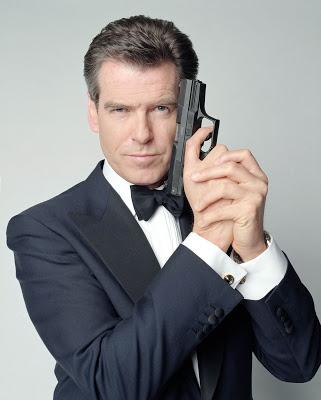
Sean Connery had to really fight for non-action hero roles during the height of Bondmania. Has it been difficult for you, as well?
No, not really. The last three Bond movies have come fast and furious. I deliberately when I did GoldenEye said to my representatives 'Don't go seeking the obvious action roles. I want to just work quietly on things like Mars Attacks! or The Mirror Has Two Faces. I just wanted to be tucked away in a film where I didn't have too much responsibility. I just wanted to see what else was going on out there...so there has been a game plan in there, especially since forming my own company. I'm aware of the vast kind of impact that Bond creates not only on my own career, but on the rest of the world. He travels well, this character, and he proceeds me. You have to live with this character and I kind of made peace with that at the beginning because I had the knowledge of what Connery had gone through. I grew up with Connery as James Bond, and contrary to what you might have read, I never dreamt of, or wanted to play, this character, until '86 when they offered me the role the first time.
How does your interpretation of Bond differ from your predecessors?
Well, that's a tough question, and I can't really give a good answer without shooting myself in the foot...but I guess if I had to say one thing, it would be that I try to make him human. Making him real for myself. When you come to play the role, you have so much fucking baggage, so much mythology. How do you make him real for yourself?
Your Bond seems to have the most heart of any previous interpretation.
He probably does. There's only one man that you want to take the belt from, and that's Connery. So you go into the ring to win. It's a challenge. Connery had a sadistic side to him. The killings in this film...I don't know. I live with more heart.
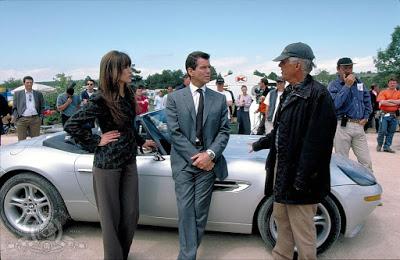 Actress Sophie Marceau, Brosnan and director Michael Apted on location for The World Is Not Enough.
Actress Sophie Marceau, Brosnan and director Michael Apted on location for The World Is Not Enough. What accounts for the longevity of the Bond films?
There's so many...the music, Monty Norman. "The name's Bond, James Bond." The whole mystique. The women. The locations. The tongue-in-cheek humor. The stunts. The gadgets. There are so many different elements. It's really hard to pinpoint exactly why.
What you're really saying is that, politics aside, the elements that make it work are timeless.
Yeah, they are timeless. People say, "The cold war is over, who's he going to fight?" Well, you're always going to have bad guys. You don't need a cold war to make James Bond fly. They kind of met on the landscape back in the 60's, and that was the shit that was going on. But he was a spy. Spies still exist. MI6 and the CIA still exist. Countries still have secrets. Hopefully I'll do another one after this one. We'll see about a fifth after that, but at some point I'll have to give it up. But (the Broccolis) are still a young family, and it's a family enterprise, so they'll find someone else. But it's all those elements that make it work. It's family entertainment, that's been passed on for generations. People loved Roger Moore. Roger did a great job, did seven films and it was entertaining. His Bond was what it was. I think you've got to respect the role. You've got to really pay attention to that. You can't just walk through it and play it flippantly. You've got to have an aside to the audience and take those moments when they come. It's a very loved role. When you read the books, the guy was human. He was hard man, but he had fear, he had doubts. He was pretty brutal. I don't know, the next time out, it would be nice to get a little more dark. But, you've got a 'PG,' so I don't know how you do that. I know that Michael would like to do one again, and I'd love to go out the door with Michael because what we set down here is a foundation, I think, certainly for another Bond film, and I think it'll whet people's appetites who liked Connery. They'll say "Ah, this is good. It goes back to the old days, but we're still in a 1990's movie." Besides, Bond is universal now. I think if you tried to go back and play him as Ian Fleming wrote it (in the 1950's and early 60's) I don't know that it would work today.
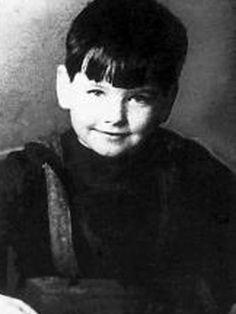
Brosnan as a grade schooler in Ireland.
Let's talk about your background. You spent your early childhood in Ireland.
It was a very tiny farming town called Navan, about 30 miles north of Dublin. I'm actually going back there next week, and they're giving me the keys to the town, which is pretty cool. (laughs) I go back there every other year, sometimes twice a year. I have a company called Irish Dream Time, and my intention is to go back there and work with young Irish writers and do Irish films to put back into my own country what I've garnered from living and being educated in England and having a career in Hollywood. Those are the intentions, those are the dreams, the desires. So far I've done it with one film, and we'll see where it leads us.
Up until the time you moved to England in 1964, you led a pretty solitary childhood, living with various relatives and so forth. Did that sense of isolation and loneliness help you develop your creative side?
I would say it played a big part in being a creative person and living within the imagination, and surviving within a community where you're the odd man out. In the 50's in southern Ireland in a tiny country town ruled by religion, to have your father leave and be the only kid without parents, yeah, that impacts your life in a very profound way. You do have to survive it, and you keep your own council, and consequently keep your own dreams. The first theatrical performance of being in front of an audience for me was being an altar boy. I didn't want to be an actor then, but thinking back on it, serving mass is a very theatrical experience. But it wasn't until I went to London, music is what pulled me into the arts. Music still plays a very important part in my life. Actually making movies and doing something like Thomas Crown has given me the opportunity to say 'Okay, we've made this movie, now let's put music on it.' So I guess living the life I've led has brought me to being an actor, yeah.
What are some of your favorite music and musicians?
The Who. I actually had dinner with Roger Daltrey the other night, and it was just amazing. The Who colored a lot of my life at that time with the mods. Pink Floyd is another band. (English) West coast music was very influential for me. Ska and bluebeat, with Desmond Dekker and the Israelites and all that. When I discovered Floyd, a lot of doors opened up (laughs) because of what it came with. Not that I was an acid head. Never done it, never will. But there was a consciousness and a freedom there where the doors just burst off their hinges. I discovered theater at the same time in this art lab. John Mayall was someone that I really dug, also. Then you have Buffalo Springfield, Love, Spirit, and then it moves on to Springsteen, the Clash...I was living in south London and the punk movement was happening. The apartment I was living in was full of punks. But then you drop the ball, and you don't know what's going on. Right now is one of those times for me. I don't know what the heck's going on in music because I don't listen to enough. My mind's somewhere else now and that kind of freaks me out because you think 'Shit, I'm not connected and I don't know what the sound is.' But you have to let that go and you find yourself listening to Coltrane, or someone else you've read about for a long time, but never really paid attention to. Or Chopin, who reinvented the piano for himself.
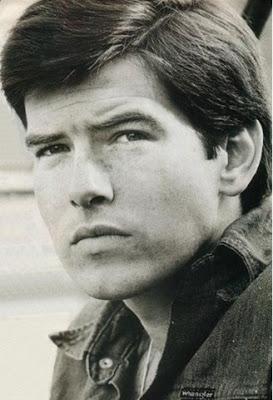 Late teens in England.
Late teens in England. London must've been incredible culture shock for a little kid from a small Irish town.
I was back to surviving again, surviving in the sense that now I was Irish. It's 1964 and you're a "mick," you're a "paddy." I was in a huge school with over 2,000 kids, whereas two days before I was in a classroom of maybe 20 kids in school with seven classrooms. It was a good time. The education was shit, but the survival instincts kick in, and you end up fighting, which is kind of a miserable thing to have to do, and so I turned to comedy. I survived through mimicking and finding the funny side of the situation. Plus, I was good at art. So I came out and became a commercial artist, which was going nowhere because I realized I wasn't that great, that I'd be sitting in a studio with guys who'd been there for many years, griping about the boss, their wages, their wives, and just generally griping.
I understand seeing Goldfinger was a life-changing event for you.
It was the first film I saw in London. I wish I could remember more of the story, but I think Pink Floyd sort of got in the way, there! (laughs) I saw Goldfinger one weekend and Lawrence of Arabia the next. So the seed was sown for the movies, because I'd never seen anything like either one. I was just blown away. I was used to two little cinemas that showed black and white movies. Suddenly, you're seeing this unbelievable character. Actually, it was Oddjob that captured my imagination in that film, he and Shirley Eaton, covered in gold paint. And the fight sequence at the end in Fort Knox, where all the money in the world was. The gold bars. The music. It was just kind of visceral. You could feel it. I was hooked on movies ever since. And that was the start of my movie education, so to speak, and I started going to the movies every weekend. The films of Clint Eastwood and Steve McQueen were big influences, as well.
It must've been a thrill for you to re-interpret Thomas Crown.
I didn't know much about McQueen as a person until I was working on the movie, and on the plane they showed a documentary called Steve McQueen: King of Cool. And that always scared the shit out of me, because he was the coolest dude. How do you out-cool the king of cool? Well, you don't! (laughs) But when I watched that film, I was blown away by the similarities of our childhoods. But when I was making the movie it was just a lovely affirmation that maybe he would have dug what I was doing. He had an influence on me, without question, the way he moved, his style. At the same time, when I discovered acting, I wanted to do theater, I wanted to do Shakespeare. When I discovered the theater, I finally got an education in literature and life.
Tell us about some of your favorite theatrical work.
I did a play with Tennessee Williams called The Red Devil Battery Site. It wasn't one of his most famous pieces, theatrically...Tennessee was near the end at that point. He didn't know that. No man does, but he was very gracious and always this twinkle in his eye. He was captivating. Brando was a mighty influence on me when I started as an actor, but he wasn't accessible, because he was so gifted. Whereas McQueen I always felt was accessible. By the time I discovered Brando, he had a complexity and a spirit of nature that was from another planet! So here I am working with Tennessee Williams, who'd worked with Brando. And Tennessee was very gracious to me. I was understudying the second male lead in the play. I had two lines in the end, as a member of a gang. About eight days into rehearsal, the guy I was understudying, I could see he was in trouble. They called me into the office and said "Do you know this role?" I said 'I know it inside out.' So I went out to Tennessee's house to audition. And I knew then that a door to an opportunity had opened. You just know that shit when you're young, and you've got to know it when you're older, too. So I went round to his place in Sloan Square, and there was Tennessee. I did the scene and I got the role, and it was a huge break. Franco Zeffirelli saw me and cast me in a play that he did. Tennessee was there for me, so to speak. He sent me a telegram opening night which said "Thank God for you, dear boy. Tennessee Williams." (laughs) I still have (the telegram)." When I worked with Joan Plowright, I got to have lunch with her and the great Laurence Olivier. I did workshops with La Mama, which was an amazing American company that opened my eyes to a whole new learning experience...You find the people that you can learn from, sit at their feet, and learn. I've been very lucky.
Your first film was the gangster classic The Long Good Friday.
My agent called me up and said "You've got a job." That was it. I didn't get a script. They told me I was an IRA hitman...I had no idea what I was in. I knew Bob Hoskins was great. I knew the guy who wrote it, Barrie Keeffe, had written some good plays. I knew it had violence to it, that it took place in South London. That's as much as I knew. Nobody invited me to the premiere. I went to a regular screening, and it turned out to be a killer movie, a classic.
Then you did The Manions of America, moved to the U.S., and did Remington Steele.
Yes, it was the happiest, wildest, greatest time of my life. It had endless opportunities, possibilities and it also came with the disillusionment that I wasn't quite there yet. I came here with the idea that I'd work with Scorsese. Taxi Driver, one of my all-time favorite films, I saw it 12 times during my days at drama school. I had dreams of doing films. I came and they offered me a TV series. And I was very happy, very proud. I owe a lot to my late wife, Cassandra, because she was the one who spurred me on to do it. If she'd listened to me, we'd still be back in South London, doing theater work. But coming to America was mighty. I'd always dreamt about America. When I was a little boy and came to England from Ireland, I looked for all the big cars and high rises, thinking England was America. I confused it. It wasn't. (laughs) But The Manions of America was my ticket to America and the performance had a rawness and an energy to it that I haven't had onscreen since then, irony of ironies, which I'd like to get back to.
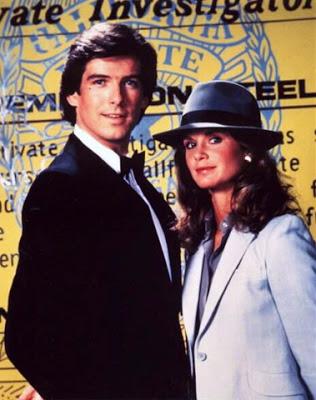 Brosnan and co-star Stephanie Zimbalist in a publicity shot for Remington Steele.
Brosnan and co-star Stephanie Zimbalist in a publicity shot for Remington Steele. Losing the chance to play Bond in '86 because of the contractual obligation to Steele must have been devastating.
It was. It was a knife in the heart. And not just for me, for my family, because we moved our children back to England and got fucked over by very short people. You get over it. It's just being an actor. Shit happens like that. But Remington Steele, fond memories. It was scary, too, because I'd never worked so fast before. Bob Butler, who created Hill Street Blues, let me play with a lot of pace, and move dialog around a lot, and consequently they wrote more dialog for me. It was a wonderful learning experience, but I also learned bad habits that didn't translate to movies. But I created a character that I loved, and I hope that others loved as well.
Your Thomas Crown Affair is the only remake I can think of that's better than the original.
Yeah, I've gotta say, thank you. It is. (laughs) It was a glorious finding of each other, John McTiernan and myself. We had a good script and I came bearing gifts to this guy, and he's someone that I really respect and admire as a filmmaker. Once he signed on, it went to another elevation of story. We made it our own, and I tried to make it my own, and not be too fearful of "the king of cool." Somewhere I think he was looking over us going "Way to go."...but now it's time to shake that sort of cinematic confidence up and get down and be mean, or do a romantic comedy. It's an exciting time. It's been a great ride.
I know you're very concerned about environmental and women's health issues.
I think they go hand-in-hand. First of all, I've got a great woman in my life right now and lucky me that I found someone that can make me feel strong and want to stand up and face the world together. I've stood up for woman's health care because it pissed off and angered me to see my children go through the loss of their mother. It was one of the most devastating things that any person can go through, to lose their partner and the parent to their child. So cancer I would love to see eradicated. The environmental work I've done stems from that. The people I've met and the journey I've been on has taught me that we've got a small planet and we're growing very fast. I love the forests. I love the oceans. So I've lent my name to certain causes and issues and it's all come about at a time when I've become a little more famous than I was.
Do you think a lot of that environmental concern stems from your childhood in Ireland?
Sure. I grew up in the countryside in one of the tiniest islands on the planet. One of the lushest, one of the greenest, one of the cleanest. I love nature, but if we carry on the way we've been going, we won't have a lot of it left. I have children, and for my children's children, I'd like to leave something behind. I travel the world and see a lot of negligence. Negligence from corporations and people trying to make a fast buck by pulling the guts out of a forest, or down in Baja, Mexico at St. Ignacio lagoon, Mitsubishi wants to go down there and make it into a salt mine. It's where the gray whales go, their breeding ground. That's one of my things. You have to choose one or two things, otherwise you spread yourself too thin, and can't be effective.
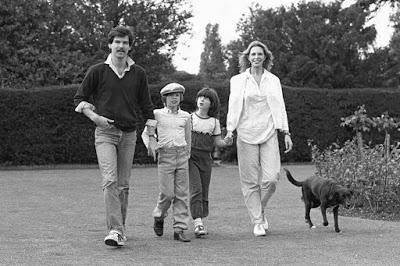 Brosnan with first wife, actress Cassandra Harris, and their children, Sean and Charlotte.
Brosnan with first wife, actress Cassandra Harris, and their children, Sean and Charlotte. I heard that you and Keely had an interesting meeting with Newt Gingrich not long ago.
Yeah, a couple years ago. We went to talk to him about the dolphin bill. We met up with him after we saw him on the Jay Leno show. We got to him through his mom, who's a big Remington Steele fan. So there you go. You use it anyway you can...Our meeting helped things for a while, but the dolphin issue bill is still pending, and they're still going out there, trying to kill dolphins.
Is there an address or website people can contact who'd like to get involved with these causes?
There are. You can go to the NRDC, the National Resources for Defense, for which I'm a board member. You can go to the American Oceans Campaign, for which I'm also on the board. They're both brilliant. Planet Ark, an Australian outfit, is also wonderful. They're non-confrontational, and just deal with information, and education for young people. If this planet is gonna survive, it's gonna be through the kids. Our forefathers really botched it up here, and didn't pay attention.
What's next on your slate?
I've got a film called Grey Owl that I did last year for Richard Attenborough. It's a true story. Grey Owl was an Ojibwa Indian who later became a well-known conservationist, wrote a great deal about the environment. It was a wonderful experience because I got to spend time in the Indian community and had a wonderful educational experience. I think it's a good film. It's a film that's close to my heart. I think it will find an audience, and already has up in Canada, where it's been released. It's a quiet piece, and I think it has resonance at the story's end. Grey Owl was a character I related to a great deal. His background was similar to mine. He was abandoned by his parents and brought up by his aunts. He left Hastings, England in the 1930's and dreamt about becoming an Indian, and did it. We portrayed the nice side of his life, but he was an alcoholic, a bigamist, a scalawag at heart. But he became an Indian, became an amazing trapper, then a young woman turned his life around and he began to write. She was a full-blooded Pawnee. She got him to stop trapping and start writing. He became a sensation and toured the world. In England, he was like a rock star. Then on his deathbed, they discovered he was a white Englishman! I think they're waiting to release it here until Bond and Thomas Crown die down. That's the wonderful thing about having a character like Bond in my back pocket: I can do these small films, big films, or anything I damn well please, really. It's a sweet time.
